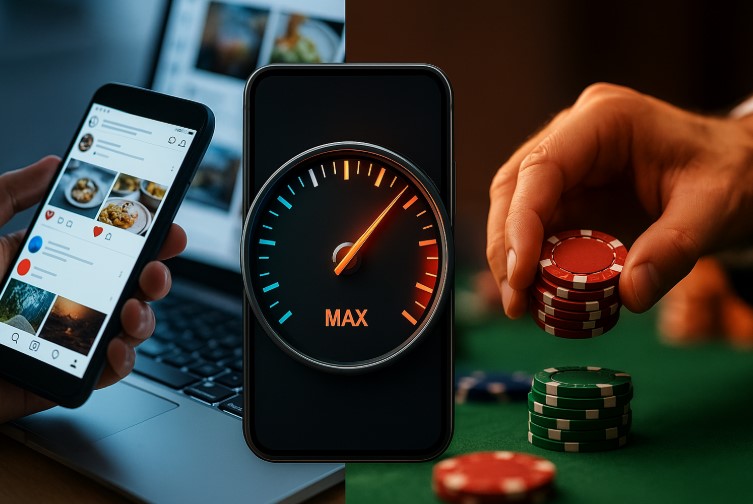We Crave Everything to be Fast, From Social Media Posts to Gaming Withdrawals

In our hyperconnected world, patience has become a forgotten virtue. We live in an era where a three-second loading time feels like an eternity, where same-day delivery isn’t fast enough, and where instant gratification isn’t just desired—it’s expected. This need for speed has permeated every aspect of our digital lives, from the lightning-quick scroll of social media feeds to the urgent desire for immediate access to our gambling winnings.
The Psychology of Instant Everything
Our obsession with speed didn’t happen overnight. It’s the result of decades of technological advancement that have rewired our brains to expect immediate responses. When we post a photo on Instagram, we don’t wait patiently for likes to trickle in over days—we refresh obsessively in the first few minutes, measuring our social worth in real-time engagement.
This same psychological mechanism drives our expectations in every digital interaction. We’ve become conditioned to associate speed with quality, efficiency with excellence, and instant results with superior service. The dopamine hit from immediate feedback has created a generation that struggles with delayed gratification in any form.
Social Media: The Speed Training Ground
Social media platforms have essentially trained us to crave instant responses. Think about it:
- Twitter delivers thoughts in real-time streams
- Instagram Stories disappear in 24 hours, creating urgency
- TikTok serves bite-sized content in an endless, immediately refreshing feed
- Snapchat pioneered the concept of disappearing messages
- LinkedIn notifications arrive instantly, making professional networking feel immediate
Each platform has contributed to shrinking our attention spans and increasing our expectations for instant interaction. We’ve become digital hummingbirds, flitting from one piece of content to the next, rarely dwelling on anything for more than seconds.
The Economics of Speed
Speed has become a competitive advantage across industries. Companies that can deliver faster service, quicker responses, and more immediate gratification often dominate their markets. Consider how:
- Amazon Prime revolutionized e-commerce with next-day delivery
- Netflix killed Blockbuster by eliminating the wait for entertainment
- Uber disrupted taxis by making ride-hailing instant
- Food delivery apps made restaurant meals available in minutes
- Streaming services eliminated the concept of scheduled programming
Each of these innovations succeeded partly because they removed waiting time from the consumer experience. Speed became not just a feature, but the core value proposition.
From Likes to Payouts: The Gambling Connection
This cultural shift toward instant gratification has naturally extended to online gambling. Just as we expect our social media posts to generate immediate engagement, modern gamblers expect their winnings to be available instantly. The parallel is striking:
Social Media Instant Gratification:
- Post content → immediate likes/comments
- Share stories → instant views and reactions
- Send messages → immediate read receipts
- Stream live → real-time viewer interaction
Gambling Instant Gratification:
- Place bets → immediate results
- Win games → instant credit to account
- Request withdrawals → immediate processing
- Cash out → funds available within minutes
The gambling industry has had to adapt to these expectations. Traditional casinos that once processed withdrawals in 3-5 business days found themselves losing customers to platforms offering instant payouts. Players who grew up refreshing social media feeds every few seconds aren’t willing to wait days to access their winnings.
The Rise of Instant Withdrawal Casinos
Smart casino operators recognized this shift early. They understood that in a world where we can order food, book rides, and stream movies instantly, waiting days for gambling withdrawals felt archaic. This realization sparked the rise of instant withdrawal casinos that process payouts in minutes rather than days.
The gambling industry responded by creating entirely new categories of gaming platforms focused on speed. Modern players have become sophisticated researchers, meticulously comparing withdrawal timeframes across different operators. Casino whizz emerged as a go-to destination for players hunting down the fastest payout options, reflecting just how central speed has become to the gambling experience. The demand for instant access has become so significant that withdrawal speed now rivals game selection and bonuses as a primary factor in choosing an online casino.
The Technology Behind the Need for Speed
Several technological advances have made our speed-obsessed culture possible:
Cryptocurrency and Blockchain:
- Enables instant, 24/7 transfers
- Eliminates traditional banking delays
- Provides immediate transaction verification
- Removes geographical payment barriers
Mobile Technology:
- Puts instant access in our pockets
- Enables real-time notifications
- Supports instant communication
- Makes immediate transactions possible anywhere
Cloud Computing:
- Provides instant scalability
- Enables real-time data processing
- Supports instant content delivery
- Makes instant backups and synchronization possible
5G Networks:
- Delivers ultra-low latency
- Enables instantaneous content loading
- Supports real-time applications
- Makes instant high-quality streaming possible
The Dark Side of Speed Culture
While our need for speed has driven remarkable innovations, it’s not without consequences:
Psychological Impact:
- Increased anxiety when things aren’t instant
- Decreased ability to focus on long-term goals
- Higher stress levels from constant connectivity
- Reduced appreciation for processes that require time
Social Consequences:
- Shortened attention spans affecting learning
- Expectation of immediate responses in all communications
- Impatience with traditional institutions and processes
- Difficulty with activities requiring sustained attention
Economic Pressures:
- Companies forced to prioritize speed over quality
- Increased infrastructure costs to support instant services
- Worker stress from expectations of immediate availability
- Environmental impact from faster delivery and consumption cycles
Speed as a Service Differentiator
In today’s market, speed isn’t just a nice-to-have feature—it’s often the primary differentiator between competitors. This is particularly evident in:
Financial Services:
- Instant payment apps vs. traditional bank transfers
- Real-time trading platforms vs. delayed execution
- Immediate loan approvals vs. lengthy application processes
- Instant fraud alerts vs. monthly statements
Entertainment:
- Live streaming vs. scheduled broadcasting
- Instant game downloads vs. physical media
- Real-time multiplayer gaming vs. turn-based games
- Immediate content recommendations vs. generic programming
Communication:
- Instant messaging vs. email
- Real-time video calls vs. scheduled meetings
- Live social media vs. traditional publishing
- Immediate customer service chat vs. phone queues
The Future of Instant Everything
As technology continues to advance, our expectations for speed will only increase. We’re moving toward:
- 5G and beyond enabling instantaneous mobile experiences
- Edge computing bringing processing power closer to users
- AI prediction anticipating our needs before we express them
- Quantum computing potentially making current “instant” seem slow
- Brain-computer interfaces eliminating even the delay of physical interaction
Adapting to Speed Expectations
Businesses across all sectors are learning that they must adapt to speed expectations or risk obsolescence. This means:
For Service Providers:
- Investing in technology that enables instant responses
- Redesigning processes to eliminate unnecessary delays
- Setting realistic expectations about what can be instant
- Finding ways to make waiting times feel shorter when delays are unavoidable
For Consumers:
- Recognizing when speed expectations are unrealistic
- Appreciating the value in processes that require time
- Managing anxiety around delayed responses
- Finding balance between instant gratification and delayed rewards
The Speed Paradox
Interestingly, our obsession with speed has created a paradox. While we have access to more instant gratification than ever before, we seem less patient and more anxious about delays. The more we get accustomed to instant responses, the more intolerable any waiting becomes.
This is particularly evident in online gambling, where players who win big want immediate access to their funds. The emotional high of winning can quickly turn to frustration if withdrawal processing takes days. Modern casinos understand this psychology and have invested heavily in payment systems that can deliver winnings as quickly as the games deliver results.
Conclusion: Speed as the New Standard
We’ve fundamentally changed as a society. Our brains have been rewired by decades of increasingly instant digital experiences, from the immediate feedback loop of social media to the instant gratification of on-demand everything. This transformation isn’t just about technology—it’s about human psychology and our evolving relationship with time itself.
In the gambling world, as in many other industries, speed has become table stakes. Players don’t just want fast games; they want fast payouts, fast customer service, and fast resolution of any issues. The casino operators who understand and cater to this need for speed are the ones thriving in today’s market.
As we look to the future, one thing is certain: our appetite for speed will continue to grow. What feels instant today will seem sluggish tomorrow. The businesses and platforms that can anticipate and deliver on these evolving speed expectations will be the ones that capture and retain the attention of our increasingly impatient, instantly-gratified society.
The question isn’t whether this trend toward instant everything is good or bad—it’s simply the reality of our modern world. We crave speed in everything, from our social media interactions to our gambling withdrawals, and successful businesses are the ones that deliver it.





